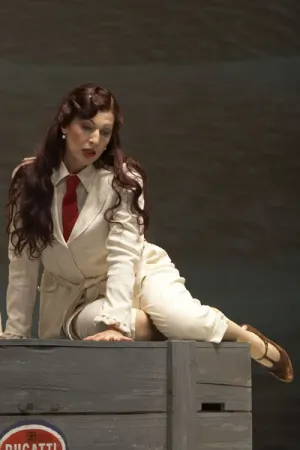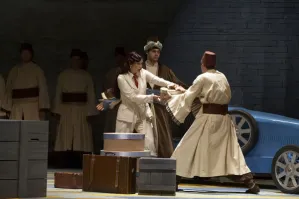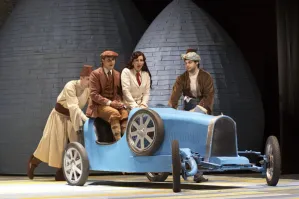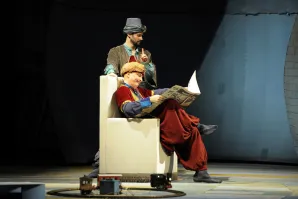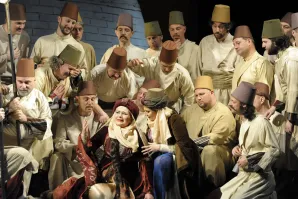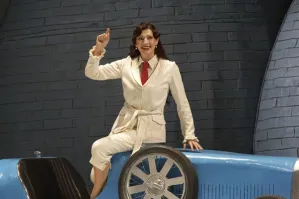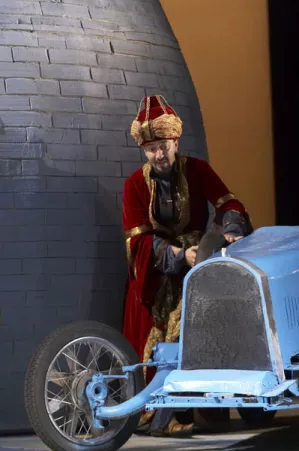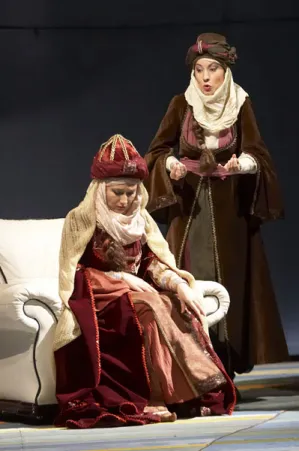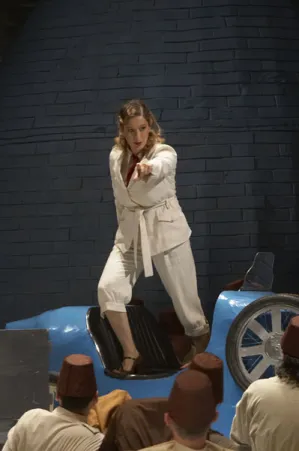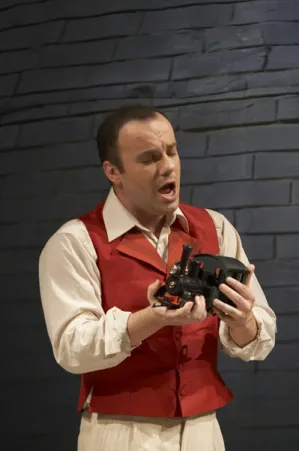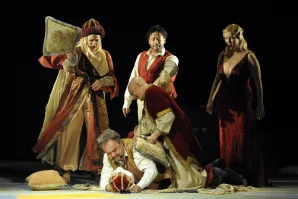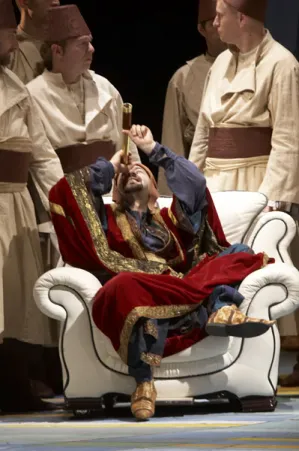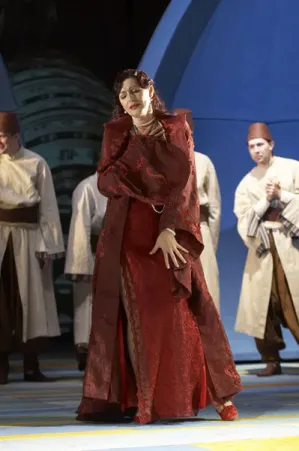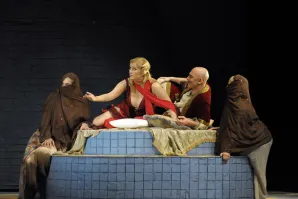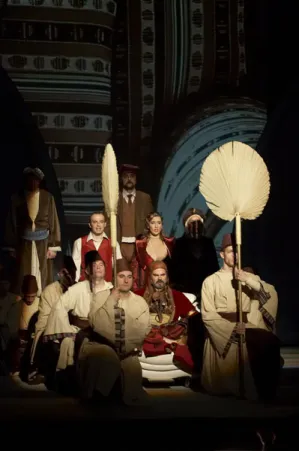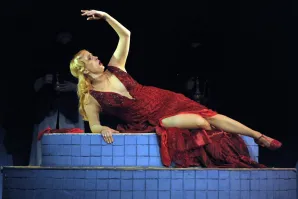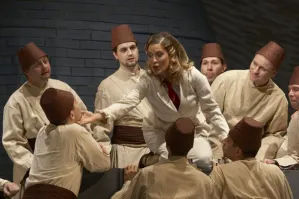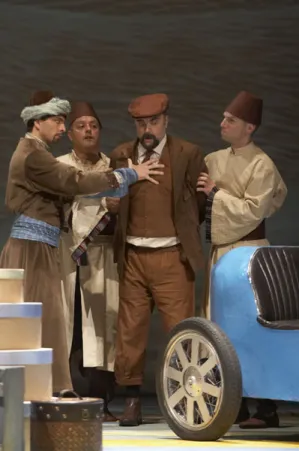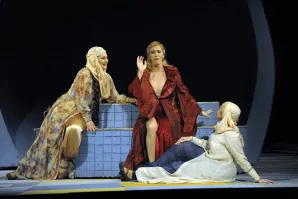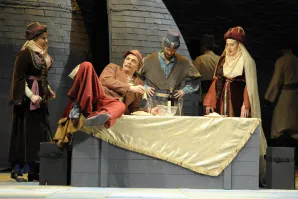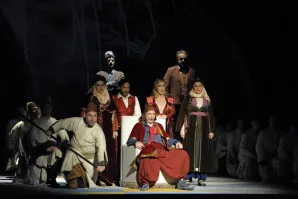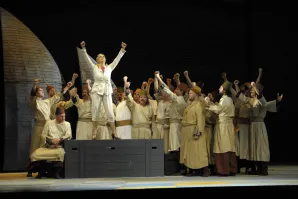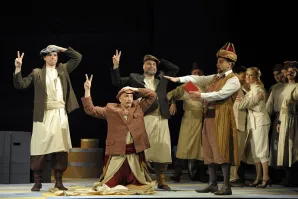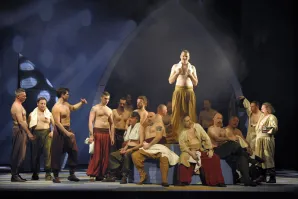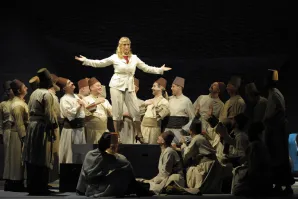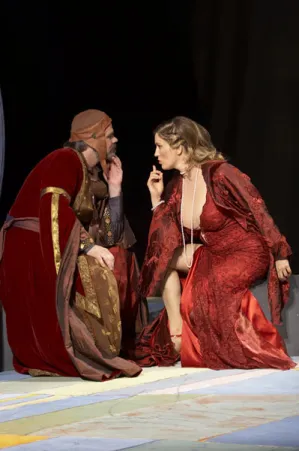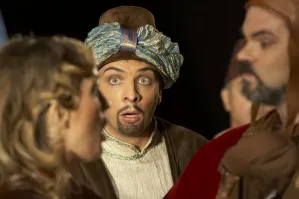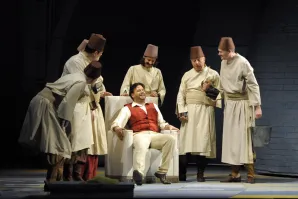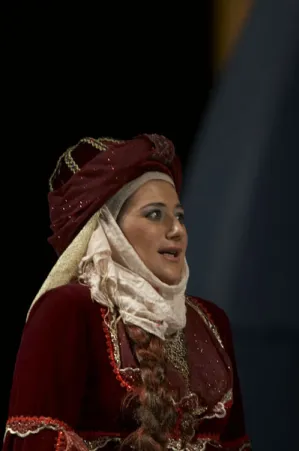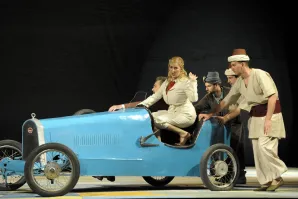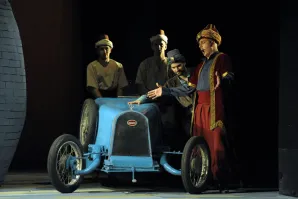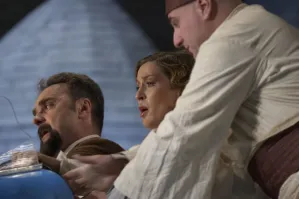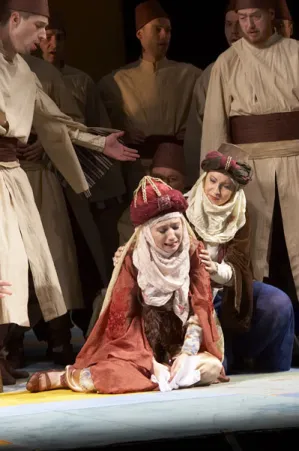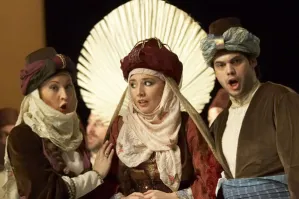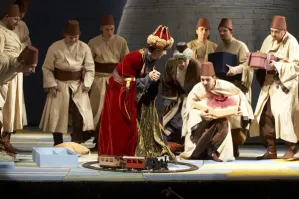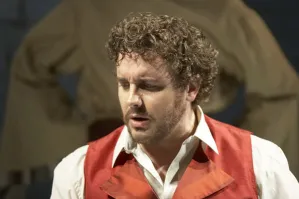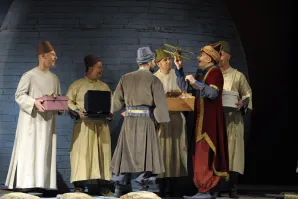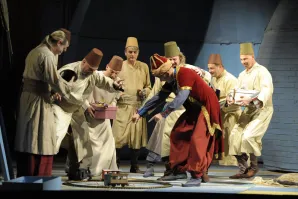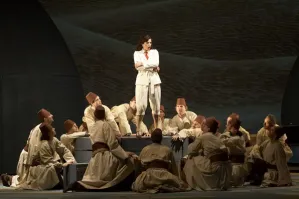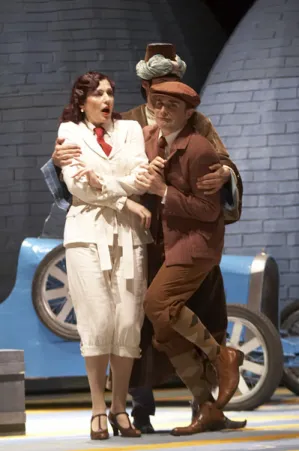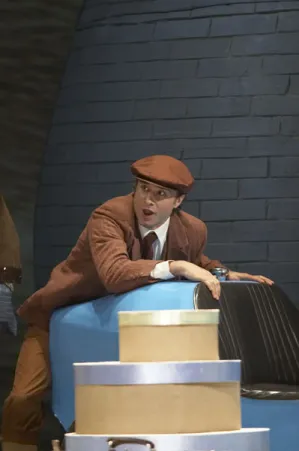L'italiana in Algeri
opera by Gioachino Rossini
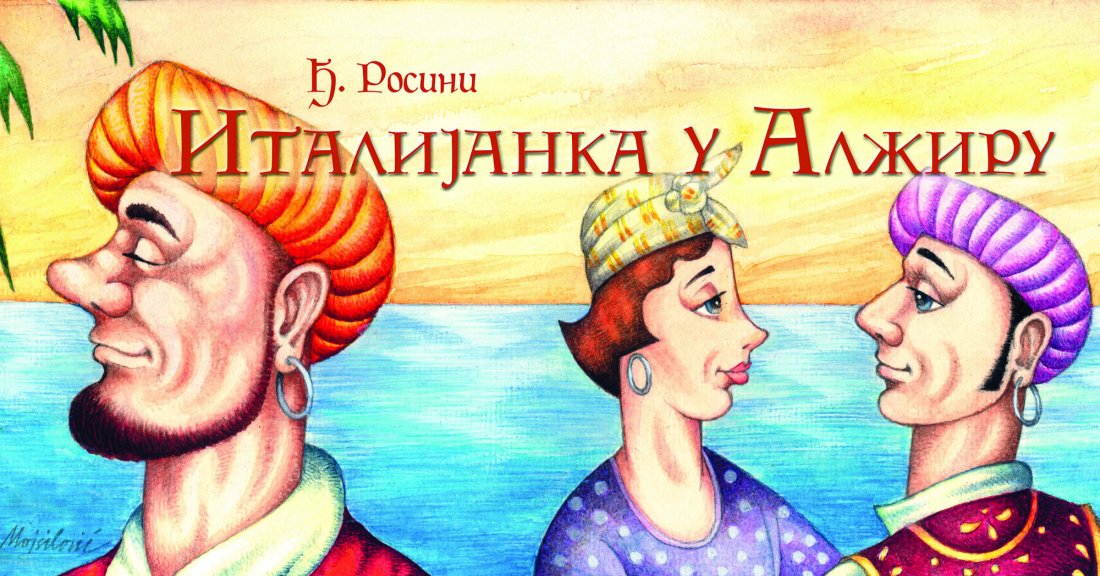
Synopsis
ACT I. In Algiers, at the seaside palace of the bey Mustafà, his wife, Elvira, complains that her husband no longer loves her. Mustafà says he has tired of his wife and will give her to Lindoro, a young Italian at the court, to marry. Then he orders Haly, a captain in his service, to provide an Italian woman for himself-someone more interesting than the girls in his harem, all of whom bore him. Lindoro longs for his own sweetheart, Isabella, whom he lost when pirates captured him. Mustafà tells him he can have Elvira, insisting she posseses every virtue that Lindoro, in his attempt to escape Mustafà's connubial trap, has listed. Elsewhere along the shore, a shipwreck is spotted in the distance, and Haly's pirates exult in the catch. Isabella arrives on shore. Though in danger, she is confident of her skill in taming men. The pirates seize Taddeo, an admirer of Isabella's, and attempt to sell him into slavery, but he claims he is Isabella's uncle and cannot leave her. When the Turks learn that both captives are Italian, they rejoice in having found the new star for Mustafa. Taddeo is aghast at the aplomb with which Isabella takes his news, but after a quarrel about his jealousy, they decide they had better face their predicament together. Mustafà promises Lindoro he may return to Italy – if he will take Elvira. Seeing no other way, Lindoro accepts, making it clear he might not marry Elvira until after they reach Italy. Elvira, however, loves her husband and sees no advantage in aiding Lindoro's escape. When Haly announces the capture of an Italian woman, Mustafà gloats in anticipation of conquest, then leaves to meet her. Lindoro tries to tell Elvira she has no choice but to leave her heartless husband. Mustafà welcomes Isabella with ceremony. Aside, she remarks that he looks ridiculous and feels certain that she will be able to deal with him; he, on the other hand, finds her enchanting. As she seemingly throws herself on his mercy, the jealous Taddeo starts to make a scene and is saved only when she declares that he is her "uncle." Elvira and Lindoro, about to leave for Italy, come to say good-bye to the bey, and Lindoro and Isabella are stunned to recognize each other. To prevent Lindoro's departure, Isabella insists that Mustafà cannot banish his wife, adding that Lindoro must stay as her own personal servant. Between the frustration of Mustafà's plans and the happy but confused excitement of the lovers, everyone's head reels.
ACT II. Elvira and various members of the court are discussing how easily the Italian woman has cowed Mustafà, giving Elvira hope of regaining his love. When Mustafà enters, however, it is to declare he will have coffee with Isabella. She comes out of her room, upset because Lindoro apparently broke faith with her by agreeing to escape with Elvira. Lindoro appears and reassures her of his loyalty. Promising a scheme for their freedom, Isabella leaves him to his rapturous feelings. After he too leaves, Mustafà reappears, followed by attendants with the terrified Taddeo, who is to be honored as the bey's Kaimakan, in exchange for helping secure Isabella's affections. Dressed in Turkish garb, he sees no choice but to accept the compulsory honor. Isabella prepares for Mustafà's visit, telling Elvira that the way to keep her husband is to be more assertive. As she completes her toilette, Isabella, knowing she is overheard by Mustafà in the background, sings a mocking invocation to Venus to help conquer her victim. To make him impatient, she keeps him waiting, as her "servant" Lindoro acts as go-between. At length she presents herself to the bey, who introduces Taddeo as his Kaimakan. Mustafà sneezes – a signal for Taddeo to leave-but Taddeo stays, and Isabella invites Elvira to stay for coffee, to Mustafà's displeasure. When Isabella insists that he treat his wife gently, Mustafà bursts out in annoyance, while the others wonder what to make of his fulminations. Haly predicts that his master is no match for an Italian woman. As Lindoro and Taddeo plan their escape, Taddeo says he is Isabella's true love. Lindoro is amused but realizes he needs Taddeo's help in dealing with Mustafà, who enters, still furious. Lindoro says Isabella actually cares very much for the bey and wants him to prove his worthiness by entering the Italian order of Pappataci. Believing this to be an honor, Mustafà asks what he has to do. Simple, says Lindoro: eat, drink, and sleep all you like, oblivious to anything around you. Isabella readies a feast of initiation for the bey, exhorting her fellow Italians to be confident. Mustafà arrives, and Lindoro reminds him of the initiation procedure. After he is pronounced a Pappataci, food is brought in, and he is tested by Isabella and Lindoro, who pretend to make love while Taddeo reminds Mustafà to ignore them. A ship draws up in the background, and the lovers prepare to embark, but Taddeo realizes that he too is being tricked and tries to rally Mustafà, who persists in keeping his vow of paying no attention. When Mustafà finally responds, the Italians have the situation under control and bid a courteous farewell. Mustafà, his lesson learned, takes Elvira back, and everyone sings the praises of the resourceful Italian woman.
(www.metopera.org)
SCORE OF L’ITALIANA IN ALGERI
Let’s assume that Rossini has never composed Il Barbiere di Siviglia – in that case, we would not have had any idea about the piece. Hence, what would we say about the score of L’Italiana in Algeri? (It is not our principal intention to avoid comparison!) The overture can be heard in concerts, not so often as the one of The Thieving Magpie, but still it is quite popular. Certainly, there are many tacts in it that are mere “add-ons”, but on the other hand there are many melodies (second theme) written by lucid inspiration. Score of the opera is light: conflicts are rare, just like at the stage. Everything is smooth and gently: we shall not burst into laughter, nor be upset by a sudden dissonant accord. We shall just be amused by light tones of music, beautiful tenor aria, and impressed by extremely hard bass coloraturas. However, we shall be surprised with the fact that main melodies are not placed within solo arias, but within joint singing (“ensemble singing”): it seems that Rossini didn’t want his arias to be sung in the streets, his intention was to motivate audience to come to the theatre and to listen the buffo finale or quintet, or trio in the second act. We shouldn’t be surprised with this as far as Rossini is concerned. It is often said that he used to overload his operas with arias. In fact, if we compare his operas with Mozart’s which we admire so, we shall find that he wrote significantly less arias: in his Italian operas Mozart composed two or three arias for each of the protagonist – but Rossini seldom did the same (and if he did, he would add to the aria a short cavatina or arioso). To remind you: Mozart’s Figaro sings three arias, Rossini’s only one! Thus we may conclude: “an ensemble opera” (as there is “a choir opera” or “a monologue opera”)? Yes, definitely “an ensemble opera”, but from Rossini’s pen. And it is always in some strange but his peculiar way also opera of arias, although more protagonists sing those arias.
Borislav Pašćan, 1976
L”Italiana in Algeri is the twelfth opera written by Rossini. It was premiered at the San Benedetto Theatre in Venice, on May 22, 1813. Maria Marcolini, famous diva, appeared as Isabella (Rossini wrote most of his coloratura mezzos for her) and Filippo Galli as Mustafa. Opera achieved great success and in a short time it was put in repertoire of almost all major European opera houses. However, it has been unfairly forgotten for more than a century.
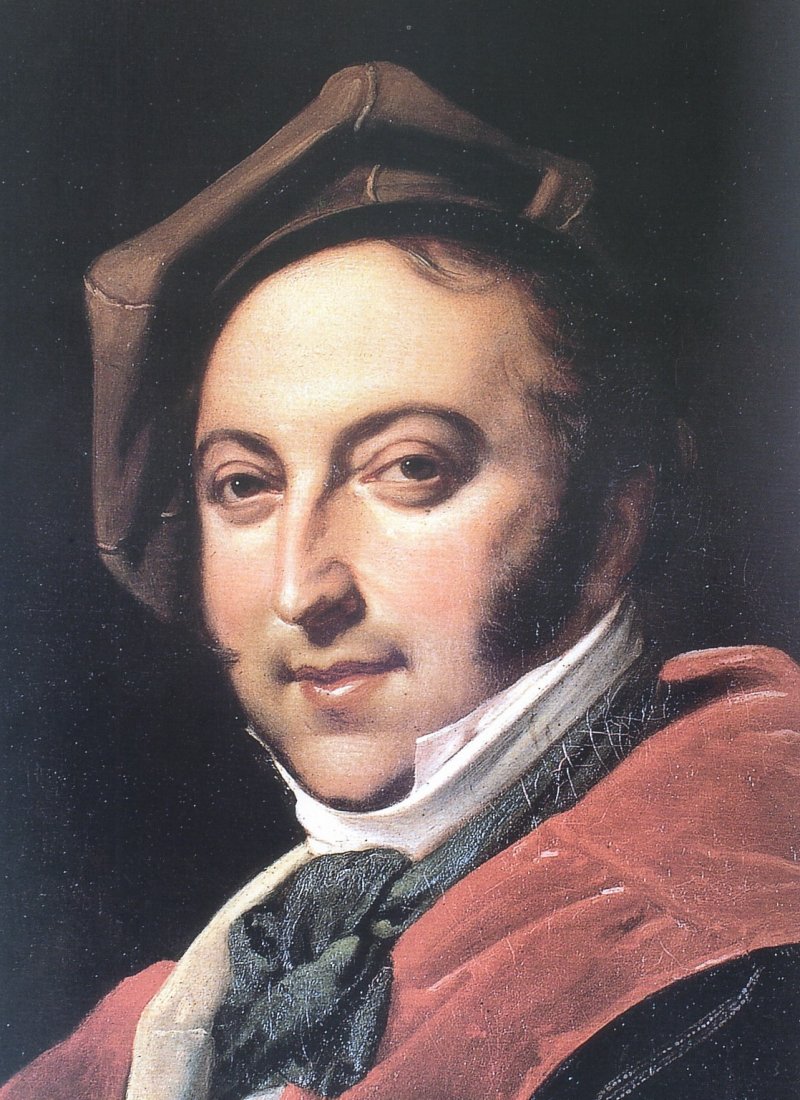 GIOACCHINO ROSSINI
GIOACCHINO ROSSINI
(born: Pesaro, 1792; died: Passy, near Paris, 1868)
Along with Verdi, Rossini was the most famous Italian composer of the 19th century. In 1810, when he was only eighteen, his first one-act comedy La combiate del matrimonio was presented in Venice. His first operas to win international acclaim were Tancredi and L’Italiana in Algeri, also presented in Venice three years later. Then came the triumph with Il Barbiere di Siviglia and since then he occupied an unrivalled position in the Italian musical world. His productivity in composing as well as his growing success enabled him to sign contracts with theatres of Vienna, Milan, and Naples. His contractual obligations per each contract bound him to compose two operas per year. In Vienna he was hailed furiously – yes, furiously is correct word to describe the atmosphere which provoked Beethoven’s anger, in spite of the fact that Rossini always was great admirer of Beethoven’s and Bach’s music. One period of his life he spent in Paris, where he experienced fiasco with his opera theatre, and later became music superintendent. His last opera Guillame Tell was produced in 1829. Although he achieved great success with it, he stopped writing opera for the remainder of his life. In that period he composed Stabat Mater and several shorter works. Up to 1848 he lived quietly in Bologna. Then revolutionary disturbances drove him to Florence. As soon as war against Austria started he returned to Paris. In Paris, he led a big house; he was always well informed about the cultural events, but he didn’t create any more – he devoted himself to the art of cookery. Rossini was the last genial and glorious representative of Italian opera. He based his work in previous 18th century operas. With florid lines, vocal embellishment, incredible speed, and spontaneity, Rossini created some of the most unforgettable music in the operatic repertoire. In Paris he composed a number of French operas in which he fully entered into the spirit of French language, he used heroic costumes and great pathos of great French operas. Although appeared as French all those operas are essentially Italian operas, operas in the Italian style. With Il Barbiere di Siviglia he achieved such a success in the genre of comic opera that no one after him would repeat, particularly when having in mind that after the fiasco with his first comic opera Verdi didn’t compose in this genre till Falstaff, a piece quite different from the old buffo-opera. Rossini’s artistic career was frequently troubled with moments of insecurity; at those moments he was not satisfied even with his best work. However, he was a true artist, great connoisseur of life and above all a witty person. In his early years he was inspired by Simon Mayr, famous Italian operatic composer of Bavarian origins. Later, he borrowed stories for his operas from Walter Scott, and finally he produced his great French operas, among which certainly the most important was Guillame Tell. Rossini accepted every music form very eagerly, although he was not so brave to break already established forms. He brought novelty only by his virtuoso arias. His most presented piece is Il Barbiere di Siviglia. Highly popular are also his overtures, and operatic fantasies.
Taken from: A Book of Operas by Jožef Šulhof, Publishing House “Bratsvo Jedinstvo”, Novi Sad, 1954
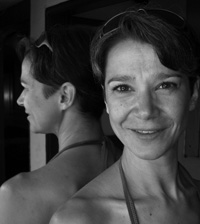 USCHI HORNER, director
USCHI HORNER, director
Born: Vienna, Austria
Staged productions:
1998 Les Miserables / Tanzforum Wien Austria
1999 Grease / Vienna Austria
2000 Little Shop of Horrors / Vienna Austria
2000 L’Histoire du Soldat / Stadttheater Gütersloh Germany
2001 Bastien und Bastienne / Festival Schloss Frauenthal Austria
2001 Rinaldo / Oakland/California USA
2002 Vogelhändler / Festival Schloss Frauenthal Austria
2003 Help, help-the Globolinks!/ Schönbrunner Schlosstheater Austria
2003 Im Weißen Rössl / Festival Schloss Frauenthal Austria
2003 Don Giovanni / Festival Schloss Kirchstetten Austria
2004 Der Barbier von Sevilla / Festival Schloss Kirchstetten Austria
2005/07 Music for Kids „Kling Klang“ / Wiener Musikverein Austria
2006 The Old Maid and the Thief / Tournee Germany
2006 Eine Nacht in Venedig / National Opera Reykjavi Iceland
2006 Around the World in 80 Days / World Premier Austria
Assistant director:
Don Giovanni / Schönbrunner Schlosstheater, Festspielhaus St. Pölten (Michael Temme)
Tanz der Vampire / Raimundtheater Wien (Roman Polanski)
Zauberflöte / Opera San Jose California (Daniel Helfgot)
Entführung aus dem Serail / Kammeroper Schloss Rheinsberg (Friedrich Meyer-Oertel)
Fledermaus / Ronacher/Wien (Günther Mörtl)
Falco / Ronacher Wien (Paulus Manker)
Carmen 2000 / Hamburg (Michael Temme)
Historia von D. J Fausten / Sofiensäle Neue Oper Wien (Günther Mörtl)
Wiener Blut / Schönbrunner Schlosstheater (Robert Herzl)
Asyl / Anton Bruckner Center (Cheslav Themann)
Das Wintermärchen / Odeon/Neue Oper Wien (Michael Klette)
Pedagogical works:
1988-91 jazz dance / various studios Austria
1990 musical theatre workshop / BORG Hegelgasse Austria
1999 musical theatre / Gymnasium Radetzkystraße Austria
2000 musical theatre / Gymnasium Radetzkystraße Austria
2001 summer program / BASOTI /California USA
2002/03 acting for opera singers /
Universität für Musik und darstellende Kunst Wien Austria
2004/05 music for children / Wiener Musikverein Austria
Others:
Choreographies for operas, cabarets, films and TV
Head of the artistic department of the Kammeroper Schloss Rheinsberg
Dialog coach for opera, films and TV
Writer for libretti and scripts
Premiere performance
Premiere: June 13, 2007 / Main stage
Comic opera in two acts
Libretto: Angelo Anelli
First performance: May 22, 1813, Teatro San Benedetto, Venice
Director Uschi Horner, as a guest
Conductor Alessandro Sangiorgi, as a guest
Sets Martina Segna, as a guest
Costumes Maria Pupuchevska, as a guest
Lights Vasil Lisičov, as a guest
In cooproduction with: CEE Musiktheater, Vienna and Macedonian Opera and Ballet, Skoplje
Premiere Cast:
Mustafa, the bey of Algiers Dragoljub Bajić* / Nenad Jakovljević
Elvira, his wife Snežana Savičić* / Ivanka Raković
Zulma, Elvira’s slave and confidant Željka Zdjelar / Tatjana Mitić
Lindorno, young Italian slave Majkl Spajers k.g. / Saša Štulić k.g.
Haly, Mustafa’s captain Vuk Matić / Nebojša Babić
Isabella, young Italian girl Jadranka Jovanović / Aleksandra Angelov / Nataša Jović Trivić
Taddeo, Isabella’s suitor Predrag Milanović / Miroslav Markovski
Eunuchs, Mustafa’s suitors
The action takes place in Algeri.
With participation of: Orchestra and Chorus of The National Theatre of Belgrade and members of the Ensemble Renaissance: Aleksandar Jovan Krstić (blowers), Andrej Jovanić (arabian lute) and Andrija Sagić(percussions)
Assistant Conductor Ana Zorana Brajović
Chorus Master Đorđe Stankov
Concert Master Vesna Jansens
Music Associates Nevena Živković, Nada Matijević, Srđan Jaraković, Ivan Jovanović, Tatjana Ščerbak-Predja
Stage Managers Nikola Kraus, Mirjana Goločevac
Prompters Silvija Pec, Biljana Manojlović
Organizers Snježana Vujasinović, Vanja Kosanić
Translation Borislav Popović
Lighting Designers Milčo Aleksandrov, as a guest, Lazar Streoski
Make-up Designer Dragoljub Jeremić
Stage Master Dimitrije Radinović
Sound Designer Tihomir Savić
*Scholarship holders of CEE Musiktheater
Décor and costumes are designed in the workshops of the National Theatre of Belgrade

